Umer Gull Biography
Gul was born in the Khyber-Pakhtunkhwa province of Pakistan he was born in a middle-class family and frequently played tape-ball cricket. People on the street encouraged Gul to become an international cricketer as they saw his superb bowling. On October 2010 Gul's family announced that he was to wed a Dubai Doctor. The doctor is from the Khyber-Pakhtunkhwa province and she was born there as well.[5][6][7] On 30 May 2012, Pakistan Army raided Umar Gul's house in Peshawar and arrested his brother on the charge of hiding a wanted militant.[8]Career
Early career
Gul was first called up for the team in April 2003, playing four one-day matches at the Cherry Blossom Sharjah Cup against Zimbabwe, Kenya and Sri Lanka,[9] where he took four wickets, and he was in and out of the one-day team after that tournament. However, he played the whole of the 2003–04 home series against Bangladesh, making his Test debut and taking 15 wickets in the three Tests, and took the second-most wickets of any Pakistani bowler in the series, behind Shabbir Ahmed with 17. However, Shoaib Akhtar, who took 13 in third place, only played two of the Tests.
Gul was retained for the ODIs against Bangladesh, taking a List A best five for 17 in nine overs in the third match, and ended with 11 wickets in the 5–0 series win. However, he could still not command a regular spot, playing three of Pakistan's nine next ODIs before finally getting dropped after one for 36 against New Zealand.
Test matches
He was recalled and played two Tests after that taking four wickets in a drawn Test against New Zealand before coming in as replacement for Shabbir Ahmed in the second Test of the three-Test series against India. After coming on as first-change bowler, Gul dismissed Virender Sehwag in his second over, and then bowled unchanged for 12 overs either side of lunch to take five Indian top order wickets - including Rahul Dravid and Sachin Tendulkar, who both had Test batting averages above 50, as did Sehwag. Gul finished with five for 31 in his spell, earning him commendation from Cricinfo journalist Dileep Premachandran, who praised his "control of line and length",[10] and he was also named Man of the Match despite conceding runs at five an over in the second innings in a nine-wicket win.
After a length injury lay-off, which kept him out of international cricket for nearly two years, Gul returned to the Pakistan fold in 2006. Firstly with quiet away series against Sri Lanka then followed by a tour to England in 2006. Gul was quickly made the lead bowler in the side due to the injuries to other front line bowlers. Gul to 18 wickets in four tests, justifying the selectors faith in him.
Later in 2006, against West Indies at home, Gul had perhaps his most successful test series. He took 16 wickets in 3 tests, including notable spells of reverse swing bowling. He was responsible for breaking Ramnaresh Sarwan's toe with a dipping yorker.
Test appearances however remained few and far between due to injuries and lack of test cricket for Pakistan.
In February 2009, Gul recorded his best test figures in the Pakistan team, taking 6 for 135 on an otherwise flat pitch.
In July 2010, Pakistan faced England at Trent Bridge and were 147/9 in their first innings. Gul scored 30* before the day was called off due to bad light. He returned the next day with Mohammad Asif and batted with intent to add another 35 runs in five overs. This saw Pakistan avoid the follow-on against England and therefore survive an innings defeat.[11]
Gul then suffered a hamstring injury in the second test when he was touring England in 2010 he was ruled out for three weeks that meant he would miss the remaining two tests. However Gul managed to recover and became fit enough to play in the fourth test[12] However they decided to rest Gul for the final test match despite the fact that he had recovered quicker than expected.
His next chance to play test cricket came against South Africa in November 2010 when he took 3 wickets in a first innings and triggered a South African collapse of 380 on a flat wicket. He took the crucial wicket with an excellent inswinger against AB de Villiers[13]
Twenty20
With injuries limiting Gul's test cricket participation, he made a distinct change to his bowling set-up. Making a focus on bowling in the late overs of T20. He got his opportunity with the absence of Shoaib Akhtar and Abdul Razzaq in the 2007 ICC World Twenty20 held in South Africa. He was generally used by Pakistan from the 13th over onwards and finished the tournament with 13 wickets, making him the leading wicket taker ahead of Shahid Afridi and RP Singh.
In the 2009 ICC World Twenty20, he performed excellently, earning the mantle from at least one pundit of "the outstanding seam bowler of the World Twenty20".[14] His five-wicket haul for just six runs when Pakistan dismantled New Zealand won especial acclaim. The spell made him the first bowler in history to take a five wickets in a Twenty20 international, and he held the record of best T20I bowling figures until 8 August 2011, when surpassed by Ajantha Mendis (6/16).[15] Mutterings were made about a possible correlation between ball tampering and the exorbitant amounts of reverse-swing he was able to extract, but he denied them categorically: "Whenever an Asian bowler performs and uses the reverse-swing, the Western cricketing countries raise the issue of ball-tampering against them."[16]
He was also part of the Pakistan team that lifted the trophy at Lord's while also finishing as the leading wicket taker of the tournament for the second consecutive time.[17]
He gained a lot of wickets bowled, in particular with late reverse swinging yorkers, which dip late to slide under the bat and leave little room for batsmen to maneuver the ball. Consequently he has also an excellent economy rate in this format of the game.
In February 2008, Gul signed with the Indian Premier League and was drafted by Shahrukh Khan's Kolkata Knight Riders franchise for US $150,000.[18] He played in six matches, taking 12 wickets at an average of 15.33,[19] including a player of the match award in Kolkata's final game in which Gul took 4-23 and scored 24 runs from 11 balls.[20]
In December 2008 Gul signed with the Western Warriors to compete in the Australian domestic 2008-09 KFC Twenty20 Big Bash tournament.[21] He performed very well in his debut match for the Warriors, taking 4 wickets for 15 runs in a losing side. He was amongst the most successful bowlers in the competition despite not being available for the entire tournament he finished second top wicket taker with 12 wickets.[22]
Internationally, Gul has taken 47 wickets in just 32 games at an average of 14.65, a truly outstanding statistic. He is the second leading wicket-taker in Twenty20 Internationals behind teammate Shahid Afridi
One Day Internationals
Gul appeared in all three of Pakistan's group matches in the 2007 World Cup taking four wickets with an economy rate of 3.13, only Shane Bond of those to deliver 100 balls was more economical.[23] He also appeared in all of Pakistan's matches at the 2007 ICC World Twenty20 taking 3/15 of 4 overs in the semi-final victory over New Zealand. He took three wickets in the final to finish as the tournament's leading wicket-taker.[24]
Batting-skills
Despite the fact that Gul is a bowler he can perform well as a lower order batsman and has proved that he has the ability to score runs quickly he finest moment with the bat came in a test match vs England in August 2010 when Pakistan were at 103/7 and Gul came into bat he scored 29 of 30 deliveries when play was ended on that day however two more wickets had fallen and the team were at 148/9 by night-time Pakistan would need 11 runs to avoid the follow-on. Gul then came and with his number 10 partner Mohammad Asif; Gul scored 34 runs in just 11 deliveries however his partner Mohammad Asif was run out at the other end and Gul ended on 65*.
Injuries
However, Gul was then ruled out of the third Test with a back injury which kept him out of cricket for an entire year. He returned to play two games at the 2004–05 Faysal Bank T20 Cup, and played some matches for Pakistan A and a Pakistan XI in warm-up games before the Test matches against England the following season, but he was not selected for the matches and has instead played three matches with Peshawar at the Quaid-e-Azam Trophy.
Gul had signed a one year contract with Gloucestershire to play in 2007, but the Pakistan Cricket Board failed to give them their permission.[25]
Shortly after making a six-month come-back from a shoulder injury in July 2010 Gul picked up a hamstring injury against England in August but it wasn't too serious and he only missed the two Test matches.









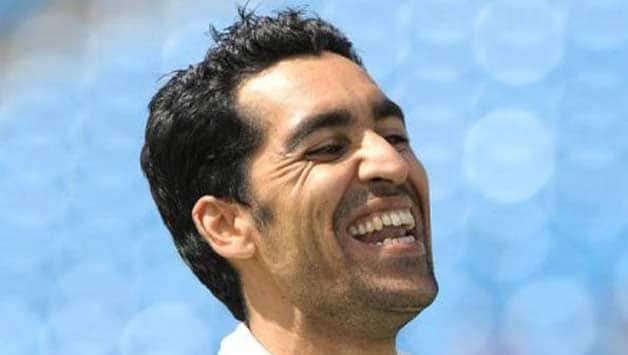

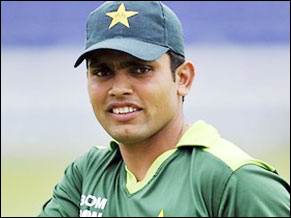










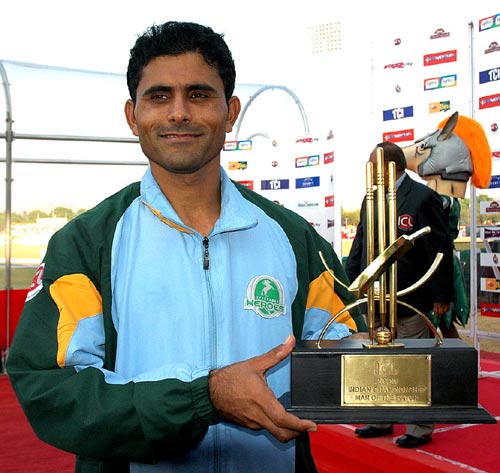





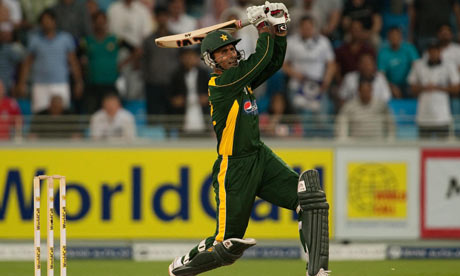






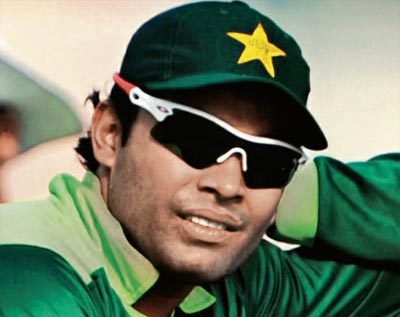




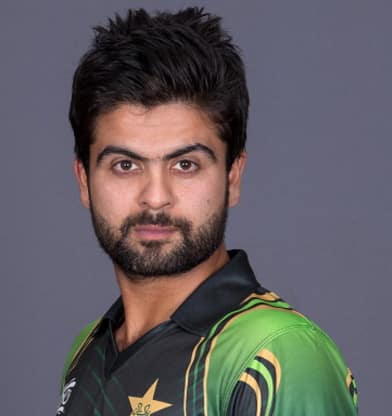







.gif)
